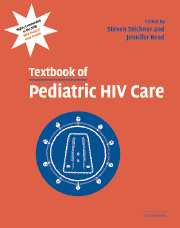Book contents
- Frontmatter
- Contents
- List of contributors
- List of abbreviations
- Foreword
- Preface
- Introduction
- Part I Scientific basis of pediatric HIV care
- Part II General issues in the care of pediatric HIV patients
- Part III Antiretroviral therapy
- Part IV Clinical manifestations of HIV infection in children
- Part V Infectious problems in pediatric HIV disease
- Part VI Medical, social, and legal issues
- 43 Clinical trials for HIV-infected children
- 44 Medical issues related to the care for HIV-infected children in the home, day care, school, and community
- 45 Contact with social service agencies
- 46 Disclosure
- 47 Psychosocial factors associated with childhood bereavement and grief
- 48 Legal issues for HIV-infected children
- Appendices
- Index
- Plate section
- References
48 - Legal issues for HIV-infected children
from Part VI - Medical, social, and legal issues
Published online by Cambridge University Press: 03 February 2010
- Frontmatter
- Contents
- List of contributors
- List of abbreviations
- Foreword
- Preface
- Introduction
- Part I Scientific basis of pediatric HIV care
- Part II General issues in the care of pediatric HIV patients
- Part III Antiretroviral therapy
- Part IV Clinical manifestations of HIV infection in children
- Part V Infectious problems in pediatric HIV disease
- Part VI Medical, social, and legal issues
- 43 Clinical trials for HIV-infected children
- 44 Medical issues related to the care for HIV-infected children in the home, day care, school, and community
- 45 Contact with social service agencies
- 46 Disclosure
- 47 Psychosocial factors associated with childhood bereavement and grief
- 48 Legal issues for HIV-infected children
- Appendices
- Index
- Plate section
- References
Summary
Introduction
HIV-infected children face a host of issues, many of which involve the legal system. These children often need to have future plans made for their care, or they may want to apply for government benefits or to participate in clinical trials. This chapter is designed to describe some common legal issues confronting the HIV-infected child in the USA. Each country will have different legal approaches to the subjects discussed in this chapter. The USA legal response to the needs of HIV-infected children is illustrative of how one legal system has dealt with the issues discussed here.
Permanent custody planning for children
Introduction
Since the vast majority of HIV-infected children have a mother who is also infected, it is important that plans be made for a time when the mother either becomes unable to care for her child or dies. Permanency planning is the process by which plans are made for the long-term legal custody or adoption of children at risk of losing their custodial parent or guardian. Such plans are particularly important when the HIV-infected parent is a single parent.
The ideal custody plan includes the identification of a stable future guardian who: (a) already has a bond with the child; (b) has the physical, emotional, and financial ability to care for the child; (c) has a long-term commitment to the child; and (d) understands and is willing to meet the special needs of an HIV-infected child.
- Type
- Chapter
- Information
- Textbook of Pediatric HIV Care , pp. 677 - 682Publisher: Cambridge University PressPrint publication year: 2005



